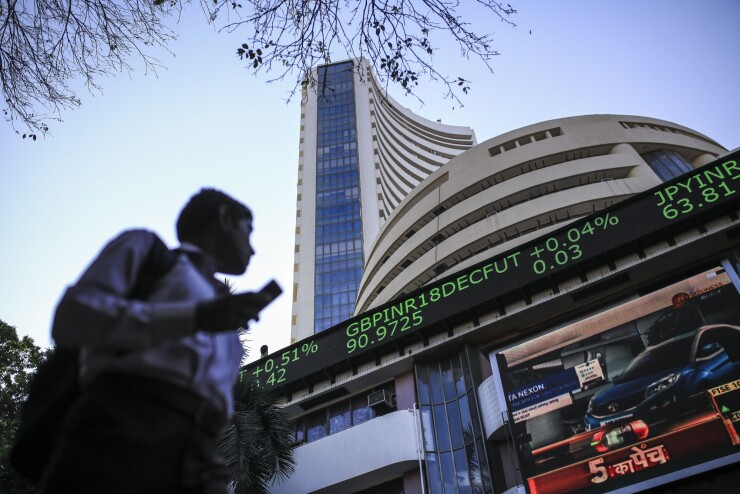Politicians from both sides of the aisle in Washington are agitating for curbs on the record pace of stock buybacks planned by American companies. But agitation has turned to outright action in one of the world’s 10 biggest stock markets.
India this month imposed a levy on its companies’ share purchases. The proximate motive was to close a loophole after introducing a dividend tax two years back — to ensure that companies pay something no matter how they return cash to shareholders. India’s practice of taxing markets started at least 15 years ago, when it put a duty on most financial transactions, a measure that European politicians have also been looking at.
Being something of a G-20 pioneer in financial taxes hasn’t stopped the rise of India’s equity market, which exceeds $2 trillion, making it three quarters the size of its economy. But the measures by Prime Minister Narendra Modi’s government have triggered the same objections from market participants in Mumbai that can be heard on Wall Street — that at the end of the day, the policy does little to redirect corporate energy toward investment.

“We need to reduce taxation” on markets rather than increase it, said Nilesh Shah, who helps oversee $25 billion in assets at Kotak Asset Management Co. “Trust in the market is missing in every way.” India’s government treats market players as “speculators, not investors,” he said.
Offering shareholders an income stream, via dividends or buybacks, is part of the inherent obligation of a publicly listed company, Shah said. So taxing that hurts entrepreneurialism and ultimately the investment that policy makers want, he argued.
Backing that analysis is India’s own Urjit Patel, the central bank governor until December, who last year criticized financial duties as hurting investment. And plenty of academic research backs Shah up.
“The big assumption that people are making in the background when they talk about preventing or limiting repurchases is, well, if shareholders get this money they are going to drink champagne,” said Jeffrey Pontiff, a finance professor at Boston College’s Carroll School of Management. “In reality people are going to invest it in other ideas.”
Regardless, India’s 20 percent levy on buybacks went into effect after the annual budget was passed July 23. Some businesses had already abandoned plans for share repurchases after the Modi administration announced the plan on July 5.
Asia’s third-largest economy already had the following financial levies:
- A long-term capital gains tax of 10% on stock appreciation of more than 100,000 rupees ($1,449)
- A 15 percent tax on companies distributing dividends, with a 10% levy on payouts exceeding 1 million rupees
- A 10 percent tax on dividends paid out by equity mutual funds
- A 0.1 percent tax on both the buyer and the seller in equity transactions. Differing levels of duties apply to transactions in bonds, mutual funds, commodities and stock derivatives
To help further address income inequality and fund the budget, the Modi administration this month unveiled plans to ramp up fees on the super-rich, with an income-tax surcharge on the highest earners more than doubling to 37 percent. The niggle there is that the move also affected some foreign investment vehicles. Perhaps not coincidentally, overseas investors pulled $1.8 billion in funds from Indian equities this month.
‘Scared people’
“Forget about raising animal spirits -- you have scared people,” said Samir Arora, the Singapore-based founder of Helios Capital Management Pte., in an interview with Bloomberg Quint.
Asked about criticism of India’s buyback tax, Finance Ministry spokesman D.S. Malik said all budget issues were addressed by Finance Minister Nirmala Sitharaman in Parliament. Transcripts indicated the issue didn’t come up.
Half-way round the world, Republican Senator Marco Rubio has blasted the Trump administration’s 2017 tax cuts as benefiting companies more than workers. Buybacks were at their highest levels in decades following that overhaul, and the onetime candidate for his party’s presidential nomination wants to tax them. Current Democratic presidential contender Bernie Sanders would block corporations from repurchasing their shares unless they pay all their workers at least $15 an hour.
“From both sides of the political spectrum, there are accusations that companies spend a lot of money on buybacks, and they invest less” as a result, said Alberto Manconi, a professor at Bocconi University in Milan. “That is an argument that is very puzzling to an academic.”
Manconi, who co-authored a study on buybacks around the world last year, concluded that “whatever way you look at it, it is not clear the buyback is subtracting any money from the economy that could be used in a useful way.”
— With assistance from Nupur Acharya and Vrishti Beniwal





